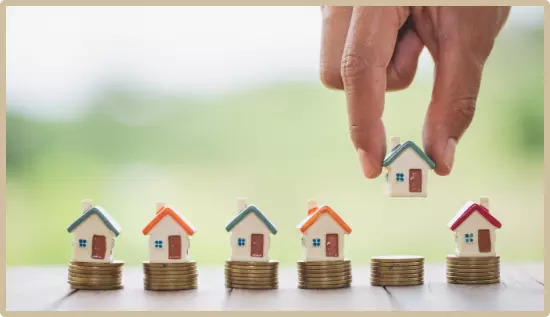In the rapidly evolving Indian real estate market of 2024, the allure of a flourishing economy is undeniable. Yet, among the opportunities, one question remains: Is investing in an under-construction flat a wise decision?
Navigating this choice demands careful consideration of risks and rewards in this dynamic investment arena, where uncertainties persist and market dynamics continually shift. This blog looks into the complex terrain of under-construction flats, carefully analyzing the advantages and disadvantages to provide you the knowledge you need to make an informed choice.
We'll navigate the alluring lower prices and the promise of appreciation, explore the flexibility of payment plans and customization options, and delve into the tax advantages and long-term investment potential. As of 2024, a few of our projects such as Abhee Riviera Royale, Abhee Celestial City and others are still underconstruction.
However, with a balanced approach, we'll also acknowledge the inherent risks – construction delays,
market uncertainties, and quality concerns
Why is Investing in An Under-Construction Flat Considered A Great Choice?
Examining The Potential Benefits of Investing in An Under-Constructed Flat:
Lower Prices: One of the biggest draws of under-construction flats is the undeniable cost advantage.
Under-construction flats often have lower prices than ready-to-move-in properties, providing you an opportunity to own your ideal home at a more reasonable cost. The staged construction process is what causes this price difference, which lets you spread out the cost over time. The value of an under-constructed flat is probably going to rise as the area develops, the infrastructure improves, and the market as a whole grows.
When you choose to sell or rent out the property, this potential for appreciation translates into a solid return on your investment.
Flexible Payment Plans:
The flexible payment plans that developers frequently provide are another benefit of flats that are still under construction. These plans typically involve installment payments which are aligned with the construction progress. By paying less up front and distributing out the remaining cost over time, this enables you to better manage your finances.
It's important to note that the specifics of payment plans may vary depending on the developer and project.
Some developers may offer more lenient payment terms, including extended payment durations or deferred payment options, to accommodate diverse buyer needs. Additionally, buyers should carefully review the terms and conditions of the payment plan, including any associated interest rates or penalties, to ensure full comprehension and compliance.
Customization Options: The developers might even provide customization choices for flats that are still under construction.
This could involve choosing layouts, fittings, or finishes within a predefined range, allowing you to personalize your space to a certain degree.
Moreover, the ability to choose fittings and finishes adds another layer of personalization to the property. From selecting the type of flooring and cabinetry to deciding on the style of faucets and lighting fixtures, buyers can infuse their unique sense of style into every aspect of the home.
This level of customization ensures that the final product reflects the buyer's individual taste and preferences, creating a sense of ownership and satisfaction from the outset.
Tax Benefits: For those seeking tax benefits, under-construction flats offer a welcome advantage.
The Income Tax Act's Section 24 permits the deduction of home loan interest up to a certain amount. Due to the longer interest payment period resulting from the extended construction timeframe, under-construction properties are more beneficial.
Additionally, Section 80C of the Act offers deductions for principal repayment on home loans, further sweetening the deal.
Long-Term Investment Potential: Apart from the short-term financial benefits, under-construction apartments can be a wise long-term investment.
With proper planning and a well-chosen location, the property can serve as a source of rental income, generating a steady flow of cash. Alternatively, upon completion, the property's value is likely to have grown significantly, allowing you to sell at a substantial profit.
Weighing The Risks of Investing In A Under-Constructed Flat:
While under-construction flats offer the above potential benefits, there are also inherent risks to consider before investing:
Construction Delays: Construction delays pose significant concerns for buyers of under-construction flats.
Issues like financial constraints or approval delays can push completion dates back, disrupting plans, straining finances with prolonged loan payments, and leaving buyers waiting for their dream homes.
These uncertainties emphasize the importance of thorough due diligence and risk assessment before investing in such properties.
Brand Value: When determining whether to invest in a flat that is still under construction, a developer's brand value is very important factor to be considered. Always go with reputed builders in Bangalore like Abhee Ventures.
Many risks related to under-construction flats are reduced when dealing with a reputable brand that has a track record of timely completion, high-quality construction, and transparent business practices.
On the other hand, investing in a project by an unknown developer with a poor reputation can expose you to delays, construction flaws, and potential financial losses.
Market Fluctuations: The real estate market is susceptible to unforeseen fluctuations. Economic downturns or changes in government policies can negatively impact property prices.
While under-construction flats offer potential, there's always a chance of market corrections leading to lower returns on your investment.
Quality Concerns: Since you're investing in a property that's still under construction, it's impossible to fully evaluate the final quality. There's a risk of encountering issues with materials, workmanship, or deviations from the promised specifications.
Limited Exit Strategy: With an under-construction flat, your exit strategy is limited compared to a ready-to-move-in property.
Selling before completion might be difficult, and renting it out might not be feasible until the flat is fully constructed and ready for occupancy.
Pro Tip: How to Avoid Any Potential Risks?
Buyer inspections of under-construction flats are crucial. Early detection of deviations from the plan empowers you to address them with the developer before it's too late. Regular inspections provide peace of mind and safeguard your investment by protecting you from potential quality issues.
Here’s how you can avoid potential risks:
Verifying Progress and Quality: Through inspections, you can keep a close eye on the development of the construction.
You can make sure the construction quality meets the promised standards and that the project is proceeding according to schedule.
Protecting Your Investment: A flat that is still under construction requires a significant financial investment. Inspections empower you to safeguard that investment.
By identifying potential issues with materials, workmanship, or fluctuations in plans, you can take steps to address them. This helps ensure you receive the quality and features you were promised upon completion.
Renegotiation Potential: In rare instances, if the construction deviates significantly from the agreed-upon plans or faces any delays, documented evidence from inspections can strengthen your position when negotiating with the developer. This could involve renegotiating the payment schedule, requesting specific changes, or even seeking a potential exit from the project if the situation is dire.
In conclusion, investing in under-construction flats in India can be a viable option for investors seeking to capitalize on the potential growth of the Indian Real Estate Market in 2024. Due diligence and caution are necessary when making this decision, though, because there are many risks and uncertainties to be aware of. By staying informed, conducting thorough research, and implementing risk avoiding strategies, investors can navigate this dynamic landscape with confidence and maximize their investment returns.








